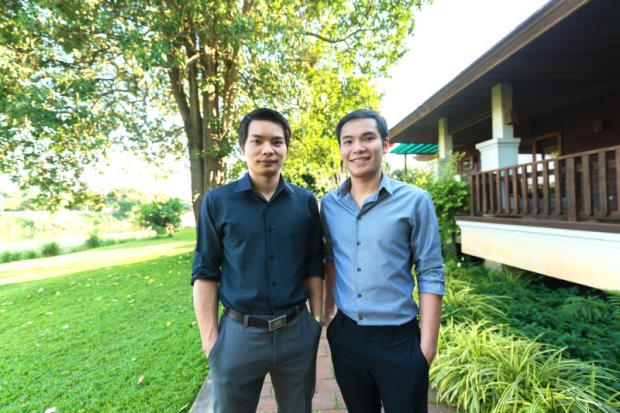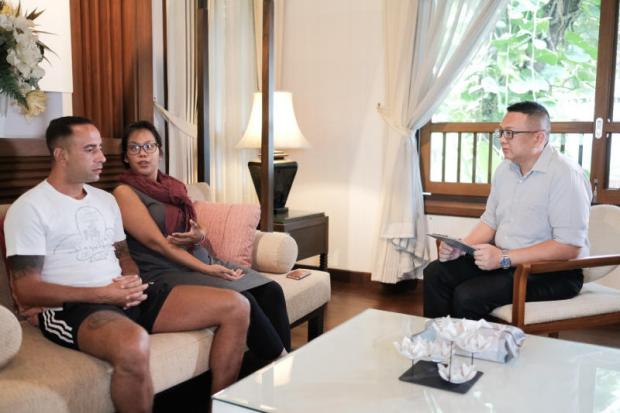On hearing the catchy chorus of Michael Bublé's Feeling Good, Athisin and Athiporn Poolsawaddi found an evocative name for their start-up, The Dawn, an English-language medical rehab and wellness centre located on the banks of the Mae Ping River, in Hang Dong, Chiang Mai.
The Poolsawaddi brothers lived in New York for 10 years before coming back to Thailand and pursuing different career paths prior to plunging into the medical tourism industry as fraternal business partners.
Athisin, 28, a former banker, and Athiporn, 25, with a background in economics and political science, share the same aspiration in helping people with issues such as addiction, trauma, depression and anxiety.
"They come from all walks of life. There's an underlying reason, such as stress or personal issues, that makes them turn to drinking or addictive substances. The problem can even be a sleeping disorder that leads people to become dependent on sleeping pills," said Athisin, the CEO. "We help them uncover the root cause, accept it rather than be in denial, so that they can move on. The rehab course generally takes one to three months and the time invested will help them get their life back."
Personalised programmes provide professional help for alcoholics, drug addicts and those with issues such as sex, gambling, internet and food addiction. The clinical team also specialises in trauma and PTSD (post-traumatic stress disorder).
After only one year of operations, The Dawn Rehab has quickly gained a good reputation from its internationally recognised team of counsellors and psychologists led by Rory Magee, director of clinical services, and Tony Tan, clinical manager.
Also on the team is Dr Ngamwong Jarusuraisin, a former assistant professor of psychiatry at Chiang Mai University, who now works full-time at The Dawn.

Athiporn and Athisin Poolsawaddi. Photos courtesy of The Dawn
The clinical rehabilitation involves the 12-step treatment model, cognitive based therapies and mindfulness techniques as well as modern technologies such as TMS (transcranial magnetic stimulation) and EMDR (eye movement desensitisation and reprocessing) for an effective and fast-acting psychotherapy.
The counselling and group sessions encourage clients to open up and share their personal problems. In addition, the clients get three one-to-one counselling sessions per week. This enables them to quickly build a bond with their counsellor and develop the trust that is vital when they are talking about difficult, often very personal, experiences.
"We accommodate a limited number of 30 clients, who provide each other with peer support. They would be overwhelmed by a larger number of people and new faces constantly coming into the group so we keep it small," said Athisin. "The supportive community in a non-judgemental environment makes the clients more open to our clinical and holistic treatment and this speeds up the recovery."
The holistic approach is driven by a thoughtful wellness programme, which include fitness and nutrition coaching, massage therapy, yoga classes, mindfulness practice and guided meditation at a temple-like construction within the grounds of a 45 rai plot of land.
The property comprises a cluster of Thai-style buildings and a grand pavilion, where the clients gather for a nutritious breakfast, lunch and dinner buffet with a nice view of the Mae Ping River. A new building serves as a residence where they check in to their private room for a stay at the peaceful sanctuary.
"The Dawn is structured like a luxurious resort but with clinical facilities for the rehabilitation programme, which is complemented by the wellness activities, as substitutes to help clients deal with their symptoms," said Athiporn, the managing director, who was formerly a representative on the Senate Standing Committee for Foreign Affairs.

Wellness activities include meditation and yoga. Photo courtesy of The Dawn
Natives of Lampang, the Poolsawaddi brothers took some time to find the perfect location for the rehab and wellness centre that had to be far enough from city life.
"We came across this property in Hang Dong, with beautiful and tranquil natural surroundings. The environment along with the supportive community contribute a lot in helping people succeed in the rehab programme," said Athiporn. "Triggers, on the other hand, can slow down the recovery, and this is why The Dawn has to be located in the countryside far from triggers, in helping clients overcome negative behaviours and grow positive behaviours."
The balance between the hard work in rehabilitation and relaxation is enhanced by weekend excursions for clients to see more of Chiang Mai. Trained support workers accompany them on the outings, which allow clients to enjoy life away from their addictions or other issues.
For the drug and alcohol addiction programme, clients first undergo a medically-supervised detox, if needed. They then go on to identify the unhelpful thinking patterns that have kept them trapped in the cycle of addiction.
Tools and skills that will help keep them on track are also taught, along with relapse prevention techniques. Uniquely among rehabs in Thailand, The Dawn also teaches life skills and future planning to encourage their clients to make the most of life after addiction treatment.
Clients completing primary care can come back to The Dawn for one month if they relapse for any reason, at no additional cost. During the month-long programme, the cause of the relapse is identified and further treatment puts them back on the right track of recovery.
"We are proud of The Dawn's unique programme and the highly individualised treatment clients receive from our compassionate and committed team of experienced clinical staff," said Athiporn. "It's rewarding to see clients succeed in the rehab programme and even more so when they come back as volunteers to help others or recommend us to friends and family."
The Dawn serves as a safe place for people to seek professional help, he added, without having to face the stigma tied to addiction.
"It's not a moral failure; addiction is a medical condition that can be managed once addicts have the tools they need to stay on track," Athiporn said. "At the end of the day, we want to help guide people to a new dawn and a new life, like in the lyrics of Michael Bublé's song."
Visit www.thedawnrehab.com or call 063-048-4877.

A counselling session with Tony Tan, right, clinical manager. Photo courtesy of The Dawn
Beating burnout
This fast-paced world has everyone so busy and stressed out by work that it has become a major problem, observed Tony Tan, clinical manager of The Dawn Rehab in Chiang Mai.
"Because of technology, the internet, the smartphone and information being readily available, everybody has become busier as if they were working 24/7," he said. "Even though they are not at the office, they are still preoccupied by work and don't find the time to really rest."
The Singaporean psychotherapist noted that high workload and stress affects everyone from young individuals in their early 20s who have just joined the workforce to top executives and high-functioning professionals.
Designed for workaholics, Executive Burnout is one of The Dawn Rehab's recovery programmes.
Burnout is a state of mental, physical and emotional exhaustion caused by prolonged and excessive stress, Tan explained, and behavioural signs include abandoning responsibilities, social isolation and letting out frustrations on other people while symptoms include substance abuse, insomnia, depression and other mental health issues.
"Without removing the executives from where they are, there is no way that they can focus on letting go. The Dawn Rehab creates a safe and therapeutic environment, so that they don't worry about their job and open up to talk about their issues," he said. "They come here with the baggage of issues in their lives. They actually know how to solve these problems, but sometimes the problems get stuck in a mesh, and they can't find a way out."
The "mind-body wellness" programme incorporates comprehensive therapy, life coaching, stress management and fitness and spiritual activities such as yoga and meditation.
Directors and CEOs in various industries have joined the programme, Tan said, and it has helped them differentiate work from personal life and reconnect with people, as well as find their life purpose.
"Don't be afraid to get help," he said. "It doesn't mean you are sick or weak. But it means you are open to improve yourself so that you can move forward for a more balanced and happier life."


